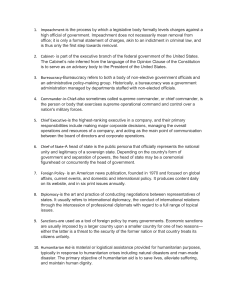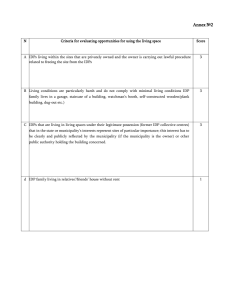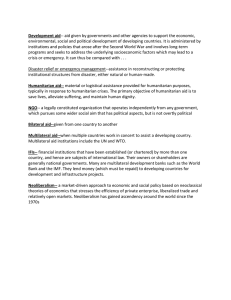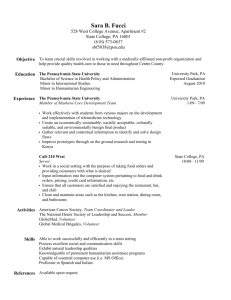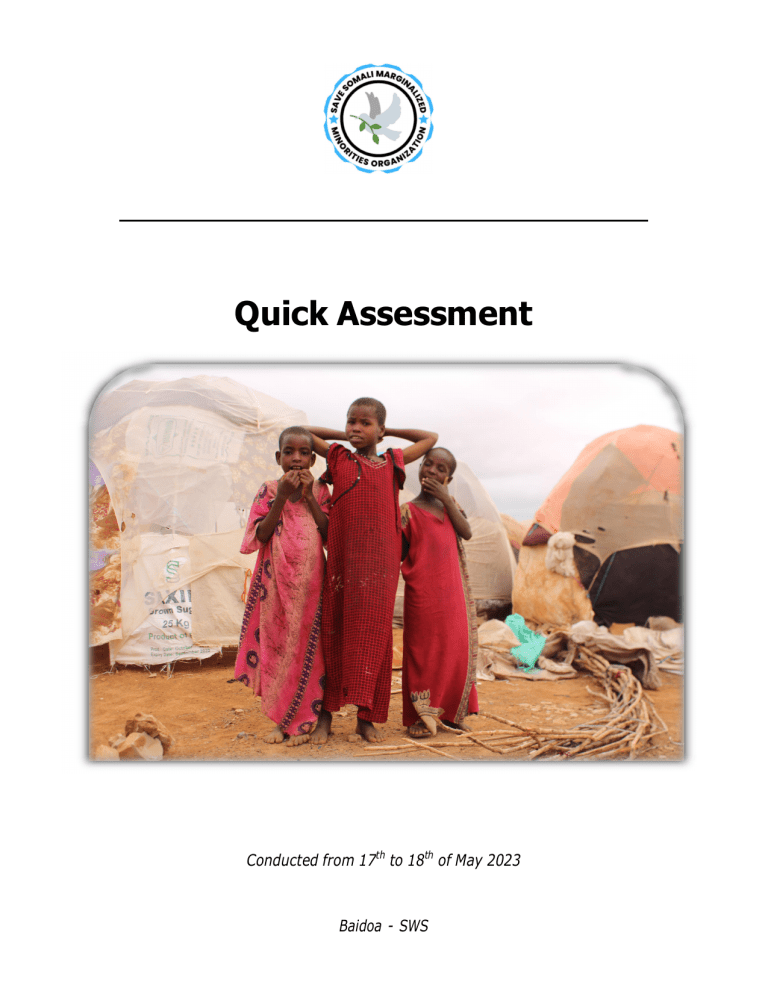
Quick Assessment Excluded Camps in Baidoa Hosting Marginalized and Minority IDPs Conducted from 17th to 18th of May 2023 Baidoa - SWS Background Save Somali Marginalized and Minorities Organization (SASMO) conducted a quick assessment of the IDP camps in Baidoa hosting the marginalized and minorities with the objective of assessing and verifying if these IDP camps do receive the humanitarian assistance provided by the UN agencies and International and National NGOs (INGOs and NNGOs) operating in Southwest State. The IDPs hailing from the marginalized and minority communities are usually faced with exclusion and discrimination due to socio-economic and political factors and are often skipped in assessment and verification exercises because of the dormant behaviours of these communities and influences by the non-marginalized and non-minority groups who tend to gate-keep the marginalized and minority IDPs because the latter have greater access to government and humanitarian offices, and to resources enabling the establishment of IDP sites such as plots of lands. However, this does not necessarily mean that the displaced people from the marginalized and minority communities do not have IDP camps and cannot access the government and humanitarian offices, as SASMO is one of the local NGOs with origins of marginalized and minorities advocating with government authorities, UN agencies and other humanitarian organizations for humanitarian support and development assistance to these groups of populations. Marginalised people are not fewer than non-marginalized people and are, as in great numbers as other groups, affected by the humanitarian crises and shocks. However, due to the above-referred socio-economic and political factors they have little or no access to humanitarian services since members of these communities are not included in the humanitarian decision-making platforms where they can advocate and plead with the decision-makers and are denied to the opportunities of access to services and resources. The members of the marginalised and minority communities especially children under five years of age happen to be the most affected and most vulnerable groups of the population and have the highest rates of acute malnutrition, high prevalence of diseases, high illiteracy and are prone to protection concerns. These results have been featured in several reports of the humanitarian agencies during the severe drought in 2022. SASMO conducted the rapid assessment of the IDP camps that host the marginalized and minority communities in an effort to identify the gaps and needs existing in these IDP camps and advocate for urgent humanitarian assistance provided to these groups. In addition, SASMO verified that the IDP camps are not identified and registered with the CCCM and eligible for humanitarian assistance by the humanitarian agencies. Unfortunately, none of these IDP camps the least of which hosts a minimum of 30 households have ever been assessed and verified by the CCCM despite meeting the requirement of an IDP to be eligible for humanitarian support and assistance. Objective SASMO quick assessment of the IDP camps in Baidoa hosting the marginalized and minority communities aimed to identify the IDP camps with marginalized and minority IDPs, assess their humanitarian situation and the gaps and needs had by these groups as well as ensure their inclusion in the emergency humanitarian responses by the UN and other humanitarian actors in Southwest State of Somalia (SWS). Assessment Methodology SASMO used various methods to assess the humanitarian situation of the Internally Displaced People (IDPs) in these camps and identify the gaps and needs of these IDP settlements. The methodology included the following: Observation SASMO team who assessed these IDP camps observed the IDP settlements in terms of shelter, facilities, access to basic humanitarian services such as water, sanitation and hygiene, health and nutrition and availability of food and cash assistance. The team conducted transect walk across the camps to identify the gaps and needs of these communities. Key Informant Interview SASMO team interviewed the leaders of the camps who hail from the marginalized and minority groups. Issues discussed in the interview with the camp leaders included; the general humanitarian problems they IDPs in the camps are faced with, engagement with other community members in the vicinity and participation in communal activities, any relationship with humanitarian agencies and camp verifying agents such as IOM/CCCM, reasons for not receiving humanitarian support and being eligible for humanitarian assistance. Focus Group Discussion (FGD) SASMO conducted focus group discussions with groups of displaced people in the identified camps to learn the concerns and issues they have and their perception to participation in and exclusion from the humanitarian interventions provided by the humanitarian actors based in baidoa of Southwest State of Somalia (SWS). The participants made grave concerns about not having equal access to humanitarian assistance in the state and that they have been sidelined from any humanitarian assistance. Since they do not have connections with the humanitarian service providers, they were always neglected. Key findings After it carried out this assessment of the marginalized and minority IDP camps in Baidoa, SASMO indentified the humanitarian gaps, needs and key findings below: General situation The assessed IDP camps are located in Baidoa (Operational Priority Zones 2, 3, 4, 5) and have never been assessed and verified by IOM/CCCM These camps host extremely vulnerable Internally Displaced People (IDPs) purely from the marginalized and minority groups The IDPs in these camps are excluded from any ongoing or planned humanitarian interventions in these Baidoa operational zones and have not been assisted to date. Most of these people were displaced from rural villages in Bay and Bakool regions due to the recent drought and conflict, as well as pressure from armed groups on their farmlands and livestock. Most of the children of the marginalized and minority are child labourers working in stonebreaking and shoe-shining services in order to feed their families, thus resulting in the children’s lack of schooling and education. Women from these marginalized groups do menial jobs such as working as housemaids or selling firewood to survive because they are not included in the humanitarian assistance such as the food and cash-based assistance to avoid such jobs Men from these IDP groups are often casual labourers such as working on farmlands on wage basis to provide sustenance to the household; thus the casual labour is often unavailable Vulnerabilities are high with these marginalized and minority IDPs, and protection concerns are the most vulnerability risk since the marginalized and minority girls and women are susceptible to sexual and gender-based violence by the wandering armed groups around IDPsettlements. Humanitarian and gaps in the camps The quick assessment found general gaps in humanitarian services including health, nutrition, WASH, education and protection that affect the marginalized and minority IDPs in these camps. The following humanitarian gaps and needs were identified: WASH services: The most of the IDPs in these camps do not have access to water in their settlements. They usually fetch water from distant areas and no water trucking provided in their camps. There are not sanitation facilities i.e. latrines and the IDP practise open defecation. Hygiene practices are poor as no hygiene promotion activities take place in these IDP camps. Food Security/Cash Based Assistance: The IDPs in these marginalized and minority camps do not benefit from any food security assistance delivered by the humanitarian actors in Baidoa as they are not eligible for humanitarian assistance because of CCCM eligibility, the camps are not approached for food security and cash-based assistance amid ongoing FS and cash emergency assistance in Baidoa – thus contributing to malnutrition in the marginalized and minority camps Health & Nutrition: These marginalized camps do not have health and nutrition facilities set up in their locations but can access sites run by some humanitarian actors which are distantly located. Mobile health and nutrition teams do not visit these IDP camps and children are hardly screened for nutrition or have vaccinations creating a vacuum for surge in malnutrition and diseases among the children. Many mothers do not know of the benefits of healthcare and nutrition because no partner is actively responding in their IDP camps. Shelter/Protection: The IDPs have shelter structures and makeshift houses which are not adequate and are mainly made from recycled materials (cardboards and ragged clothes). The camps are not fenced and the makeshift houses not lockable – increasing the risk of protection and climatic adversities such as bad weather and rainfalls. The shelters are not covered with plastic rain-sheets because partners distributing such materials are not providing services in these camps. Education: Children from the marginalised and minorities generally lag behind in education and have the highest rates of illiteracy – this linked mainly to lack of access to enabling services such as food security and nutrition. The children hardly go to school and no education in emergency facility is constructed in any of these marginalized and minority camps. There is a gap in education needs for the marginalized and minorities in the IDP camps. The vulnerabilities and risks facing these marginalized and minority communities in terms of humanitarian aspects are greater than assumed. The gaps in needs and assistance that have been raised actually exist and need to be addressed by humanitarian actors. SASMO studied that these gaps have been left unaddressed and no attention paid to the plight of the marginalized and minority IDPs. These IDP sites were not assessed and verified by the CCCM and they did not receive the emergency support provided by the humanitarian actors. List of Excluded IDP camps hosting marginalized and minority IDPs S/N IDP Camp Name 1 2 3 4 5 6 7 8 9 10 11 12 13 14 15 War Odey Buurbakaar Gubadi Buur Nagaati Beer Saranle Wiin Caratuur 1 Eedin Waal Daruur Faajir Madiyay Gaashaan Buur Banbara Lugun Dheeri Cill Gugow Qadiidle Wiin Saruro Eyle Xeydabaale Location No. of HHs Horseed Horseed Horseed Horseed Horseed Horseed Horseed Horseed Horseed Horseed Berdaale Berdaale Berdaale Isha Insha 87 125 93 65 85 90 73 75 105 75 120 35 105 35 Latitude Longitude Camp leader 3.150813 3.150720 3.152375 3.149462 3.148401 3.147867 3.157470 3.139416 3.137484 3.148855 3.106464 3.129092 3.133319 3.101424 3.105108 43.668279 43.667881 43.667258 43.668378 43.668392 43.670650 43.671797 43.665690 43.662139 43.665105 43.667890 43.677352 43.676957 43.659393 43.660742 Adan Hassan Adan Alinur Isack Ahmed Muslimo Mohamed Ali Abdullahi Isack Moalim Ibrahim Daud Moallin Habibo Abdirahman Adan Idiris Buule Hassan Mohamed Hassan Ali Hassan Ali Isack Sacdiyo Isack Abdirahman Adey Mohamed Hassan Osman Mohamed Yare Isha Mayow Mohamed Hussein Adan Mohamed Faduma Ibrahim Phone number 0618727804 0615267137 0618331053 0615984115 0616140878 0619130383 0619264918 0612446907 0615759969 0614472729 0619632448 0618709531 0616795564 0610604331 0615956837 Conclusion/Recommendation Having conducted this quick assessment of the IDP camps with marginalized and minority IDPs and studied the humanitarian situation of these IDPs, SASMO recommends that: Urgent humanitarian response in all sectors particularly immediate food and cash assistance at this critical time be extended to the IDPs in these indentified marginalized and minority IDP camps Routine programmatic services of WASH, Protection, Health and Nutrition, and Food Security be implemented and available to these IDP camps like other camps in these operational priority zones. The CCCM assesses and verifies these IDP camps allegedly excluded from the humanitarian assistance. Partner(s) with origins of the marginalised and minorities be included in the local partners of the UN agencies and INGOs to implement partner projects and ensure inclusion of the marginalized and minorities in the humanitarian interventions. Involvement of SASMO in the humanitarian decision-making forums and platforms be encouraged so that it brings marginalized and minority expertise to the table of discussion and decisionmaking Participation of needs assessments and service mapping be inclusive of representatives from the marginalized and minority communities. END +++
